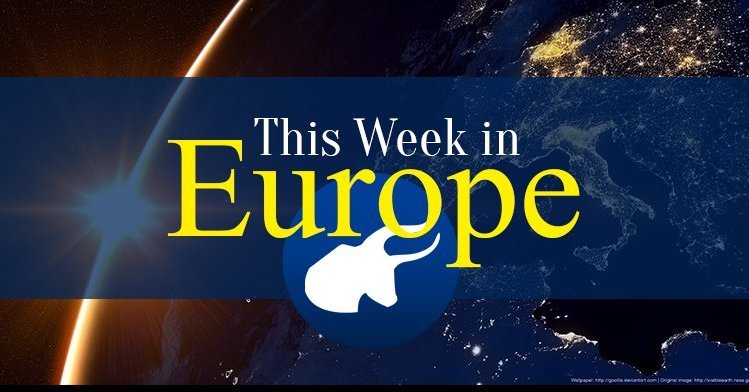Germany sees lowest crime rate since 1992
In 2017, 5.76 million crimes were reported in Germany. That may seem like a lot, but the definition covers a wide array of acts, and it actually represents a 5.1% drop when compared to 2016. Interior Minister Horst Seehofer announced that the “frequency of fewer than 7,000 cases for every 100,000 inhabitants is unprecedented, even in a 30-year comparison.” As for politically-motivated crimes, the decrease amounts to 4.9%, after increases in the last four years. However, Germany saw a rise in violent crimes perpetrated by the political left - mainly due to rioting at the G20 summit in Hamburg. The political right, by comparison, dropped its crime rate by 33.5%, lowering it to 1,130 incidents. Germany also witnessed a decline in attacks on asylum and refugee shelters, with 312 offenses recorded in 2017 compared to 995 the previous year, a drop of 68.6% attributed to the German authorities.
Armenia chooses new PM
On Tuesday, the Armenian parliament voted in favor of a new Prime Minister after its “peaceful revolution” took long-time president Serzh Sargsyan out of power. The former president had been looking to become PM himself, after transferring much of the presidential power to the office. Prime Minister only for a short period due to the protests, Sargsyan resigned, being replaced with opposition leader Nikol Pashinyan. After surviving a 9-hour Q and A with the MPs of the ruling party, Pashinyan amassed enough support in the parliament to secure the role of Prime Minister. He promised new elections but is also seeking to reform the electoral laws, as he believes that the current system favors the voter base of the former ruling party.
Macron wins Charlemagne Prize
On Thursday, French president Emmanuel Macron was given the Charlemagne Prize. He was praised for “courageously pioneering the revitalization of the European dream” by the Board of Directors of the Society for the Conferring of the International Charlemagne Prize. The ancient ruler is prized as the “founder of Western culture”, and the award named after him was received by figures such as Commission President Jean-Claude Juncker in his former capacity of Prime Minister of Luxembourg (2006), former NATO secretary General and EU foreign affairs chief Javier Solana (2007), German Chancellor Angela Merkel (2008), Council President Donald Tusk in his former capacity of Polish Prime Minister (2010), former Council President Herman Van Rompuy (2014), and former President of the European Parliament Martin Schulz (2015).
English language survives Brexit
The departure of the United Kingdom from the European Union was seen as the opportunity of the revival of French continent-wide. The dream was short-lived, as Ireland and Malta - members of the EU - are aiming to list English as an official language, thus securing its spot among the languages of the Union. Officials from other European countries - such as Poland, Italy, or the other Eastern European states - sighed with relief, as they are looking to make English the language of reference inside the EU. Some European institutions have made special efforts to prioritize English as the go-to language for communication. As POLITICO reminds, last month, France’s EU Ambassador Philippe Léglise-Costa walked out of a diplomatic meeting after the Council decided to use only English-language translation in a new working group on the EU’s long-term budget. Moreover, in recent years, the European Parliament stopped requiring one translator for every language spoken by its MEPs during foreign missions. Instead, it prioritizes English, with the European Court of Justice soon to follow.
Berlusconi free to run for office
On Saturday, an Italian court in Milan has lifted the ban on Silvio Berlusconi holding public office, initially instituted due to his conviction for tax fraud. The event comes just as the top-scoring parties in the last general elections, the 5Star Movement and the Northern League, are debating either forming a government or having new elections. Silvio Berlusconi’s own party, Forza Italia, agreed to aid the League in forming the government with the 5Star Movement. Now, a new round of general elections would allow Berlusconi to run himself.
Human rights commission hunted Russian dissidents
This past week, it was revealed that the International Commission against Impunity in Guatemala, a UN-created, EU-funded body, helped Kremlin corporate agents find and jail a family of Russians. Hiding in Guatemala after oligarchs raided their paper products firm and raped their 16-year old daughter, the Bitkovs were pursued through VTB, a Kremlin-backed bank. They had committed the “crime” of refusing to sell their company to the oligarchs.
Petras Austrevicus, a Lithuanian MEP, has raised the issue with the European Commission, asking for an independent investigation into the Commission that was originally created by the UN to combat serious crime. Together with the U.S. and Canada, the EU had been financing the body for seven years.
Puigdemont names successor
The former president of Catalonia and the organizer of the October 2017 independence referendum, Carles Puigdemont, nominated a pro-independence politician as his successor at the presidency. Currently in exile in Germany after a court refused to extradite him, Puigdemont looks to pacify the region of Catalonia after months of political instability. His solution bears the name Joaquim Torra Pla, known as Quim Torra, a former president and publisher of the Catalan pro-independence association Omnium Cultural. He is also the first candidate who has not been jailed, exiled or prosecuted in the aftermath of the independence referendum, according to EURACTIV. However, Quim Torra is from the same party as Puigdemont, and shares the political line of the former leader. The Spanish central authorities encouraged the formation of a stable Catalan government, stating that dialogue can finally take place.


Follow the comments: |
|
